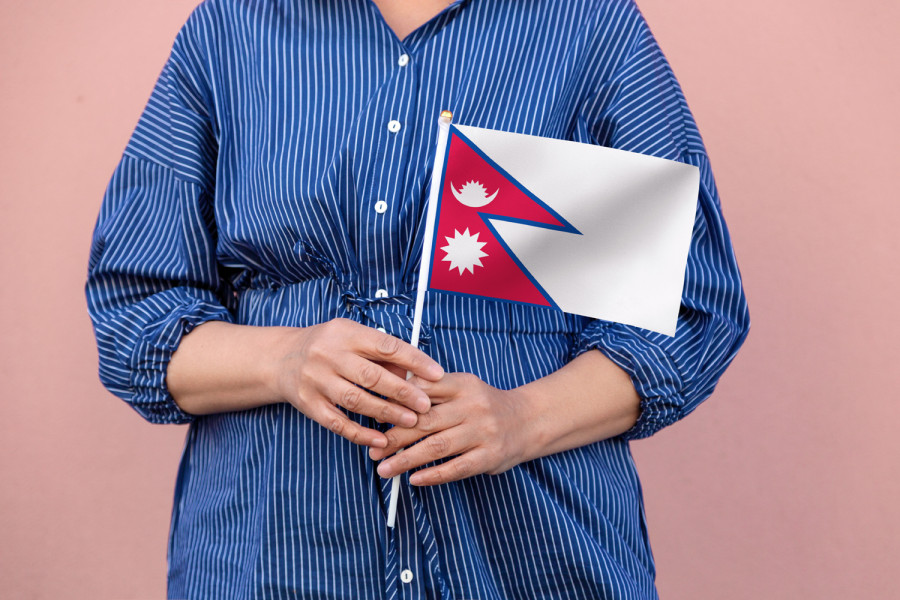Opinion
If you defend unequal citizenship rights, you are plain insecure
The defence of unequal citizenship rights is a defence of the Khas-Arya man’s status, and not a question of state sovereignty.
Amish Raj Mulmi
It would be redundant to say that the proliferation of social media has led to a multiplicity of opinions. Everybody has a view today, as they rightly should. But if one were to argue all these views—opinions, perspectives, call it what you want—were equal and correct, one would be living in a fool’s paradise. Not all opinions are equal—and some are outright wrong. I could provide the example of flat-earthers and anti-vaxxers in the US, but why go so far when there are examples close to home?
Consider this tweet made just last week by a senior journalist as the ‘debate’ around the citizenship bill went on in Parliament: ‘Why should those women who cannot reveal the father’s name give birth to children? The mother does not give birth to children by themselves, do they? There are several Mary Stopes clinics across Nepal for those women who do not want to reveal their sex partner’s name. Why should an infant’s destiny be that of a fatherless child?’ [translations mine]
The problems in this line of thought are too many to enumerate (the Mary Stopes clinic provides contraception and safe abortion to women across the world). Gender inequality is indefensible by any means; a defence of Nepal’s unequal citizenship laws by suggesting single women should abort their unborn child is a misogynist position reflecting the author’s male gaze of the world. But when it comes against a background of a pointed assault on the idea of equal rights, when commentators and ex-Bollywood actors from a political family begin to equate citizenship rights with national security and sovereignty, it tells us a lot about the defence of a positively archaic and absolutely incorrect view that women aren’t equal to men. By linking the question of women’s citizenship to reproduction, and by pointing unwed mothers (or single mothers by choice) towards abortion clinics, the repugnant tweet essentially told us the Nepali man simply considers their woman to be a reproductive vehicle and little else. In his Hindu view of the world, he upholds the idea of the ‘virtuous wife’, and ‘treats women’s sexuality as a risk to society at large’.
Let’s step back and think about the idea that a child born to a Nepali mother and a foreign father may hurt state security if citizenship laws were equal. Why do folks think so? If a Nepali commentator who supports unequal citizenship rights is to be believed, the primary reason why the issue of Nepali citizenship is so sensitive is because of India and China and their huge populations. ‘Any minor infiltration of the population of these countries will leave Nepalis as a minority and foreigners as a majority… Indians have infiltrated the Nepali citizenship process the most.’ (translation mine)
It’s a man’s world
But who is a Nepali, to begin with? In the commentator’s reading, it’s clear he believes a ‘Nepali’ to be pahadi in origin; he identifies the 1952 Citizenship Bill as the root of the problem which gave Nepali citizenship to Indian-origin migrants who settled in Nepal. To borrow from political scientist Mahendra Lawoti’s terminology, it is the CHHEM (Caste Hill Hindu Elite Male) who should be most worried about ‘infiltration’ as Nepali citizens. Historical error aside (the Bahuns and the Chhetris are both non-indigenous to Nepal), their population is a minority to begin with, but they control the state and its organs. The commentator equates Nepal’s security with the security of this population group’s monopoly over the state’s forces. The defence of unequal citizenship rights is thus a defence of the Khas-Arya man’s status, and not a question of state sovereignty. By rooting it in anti-Indianism, they’ve appealed to the foundational idiom of Nepali nationalism for populistic support.
What makes Nepali citizenship so precious that only the Nepali man can be responsible enough to bestow it fully on his children? The recent amendments to the citizenship laws tell us the insertion of the many ifs and buts for citizenship through mothers is essentially a vehicle for controlling women in pursuit of a ‘pure society’. As a former anti-corruption chief said, “We don’t want foreigners coming in and leading the country, do we?”
The controversial provision on the citizenship bill states that ‘a child of a female citizen can obtain citizenship by descent in cases where the father’s identity is unknown, after the applicant provides an explanation and if the government maintains an official record stating the same.’ A report on the parliamentary discussion around this provision tells us the reasoning behind so many ifs and buts is that granting equal rights to women will result in ‘samajik vikriti’, societal decline. NCP MP Jhapat Rawal had this to say: ‘My wife and I are living peacefully today. But tomorrow, if my wife doesn’t like me anymore, and if, during my son’s citizenship process, she says the father cannot be identified, what will happen? Where do you think society will go if such things happen? Let’s not talk about patriarchy or matriarchy right now, but discuss this as citizens. Children must know both their parents.’ [translation mine] Rawal was not done. According to a report in this paper, he said, ‘If a child born out of rape doesn’t have to identify their father, then rape cases will increase. Children will lose their right to know their father’s identity and this will also lead to women indulging in immoral acts.’
If this were not enough, Nepali Congress MP Dilendra Badu had an even better explanation. ‘What will happen if women start a campaign to bring in children from abroad and we start handing out citizenship by descent without the woman declaring the identity of the father? What will happen if foreigners make mothers out of women and send their children here?’
Stuck in the past
Eyerolls aside, in all these instances, what emerges with clarity is the idea that Nepali citizenship rights are based on Brahminical ideas of a pure society. We are Nepalis, and we must be careful about who can become a Nepali, the lawmakers are saying, and we cannot trust our women to be responsible. ‘For, when women are corrupted, all is lost.’ No such standards apply for the Hindu man, obviously. As academic Uma Chakravarti notes, ‘the mechanism of control upon women's sexuality could actually be effective’ only by subordinating the woman.
Chakravarti suggests the ideal of the ‘pativrata wife’, the faithful-to-husband wife, was a ‘masterstroke of Hindu-Aryan genius’. ‘The actual mechanisms and institutions of control over women's sexuality, and the subordination of women, was thus completely invisibilised and with it patriarchy was firmly established as an ideology since it was “naturalised”’, she writes. Breaking down Hindu and early Buddhist scriptures, she suggests that recalcitrant women posed a threat to the established social order, and ‘to prevent such a contingency women's sexual subordination was institutionalised in the brahmanical law codes and enforced by the power of the state.’ Thus, ‘the right to control a woman's total existence, especially regulating her impulses, vested firmly in the male members of her family, first in her natal household and then in her conjugal household.’
How else can we read comments by 21st century Nepali men (and some women) except in this light? The Nepali state (and those who enable it) believes equal citizenship laws will mean the erosion of Nepali society through the loss of sovereignty. As incorrect as that view is, what does it say about the existing state if something as fundamental as equal rights can erode it? Let’s be clear, it is not up to the state to declare men and women are equal in the first place. If anything, the history of women’s rights movements across the world have told us the state will discourage such struggles.
I return to my initial argument. Some opinions, despite one’s wholehearted belief in them, are simply incorrect. Those who defend unequal citizenship rights on any ground are no different than those who believe in a flat earth or that vaccines cause autism. It is absolutely imbecilic to even think some wish to defend a line of thought that holds men and women unequal. Such thinking belongs to an age of ignorance, and should not be endorsed at all.
Mulmi tweets at @amish973




 9.89°C Kathmandu
9.89°C Kathmandu










